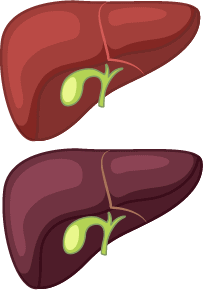Fatty Liver
Everything your body takes in is eventually processed by your liver. A diet high in sugar and carbohydrates can result in fatty deposits remaining in your liver, thereby leading to scarring. This scarring can lead to a more condition known as cirrhosis. There are some signs to look for that will help you catch this disorder while it is still in its earliest stages before it has had time to cause more significant damage.
Hepatic Steatosis
What is Fatty Liver Disease?
There are two types: Alcoholic Fatty Liver Disease (AFLD) and Non-Alcoholic Fatty Liver Disease (NAFLD). AFLD occurs in heavy drinkers, while NAFLD is found among casual drinkers and even in those who abstain entirely. Both result from an excess build-up of fat in the liver. While fatty liver can result from heavy drinking or a poor diet, exposure to toxins and genetics might make you more susceptible as well.

What Are The Common Symptoms?
The signs and symptoms of fatty liver disease are nearly the same in everyone, regardless of whether the condition is alcoholic or non-alcoholic. One of the first signs of fatty liver is pain or discomfort in your upper right side. This may be accompanied by:
- Unexplained weight loss
- Fatigue
- A loss of appetite
- Yellow skin, eyes, or nails
- Abdominal pain and swelling
- Redness in the palms of your hands
- Enlarged blood vessels that are visible just beneath your skin’s surface
- An enlarged spleen
How Is Fatty Liver Treated?
At the present time, no medications have been approved to help treat this condition. As such, lifestyle changes are needed in order to manage fatty liver. Avoid alcohol and consume a healthy diet that is low in saturated and trans fats. Limit sweets and carbohydrates and add more vegetables and whole grains to your menu. Manage your weight and get at least 30 minutes of moderate exercise for at least four or five days each week.
